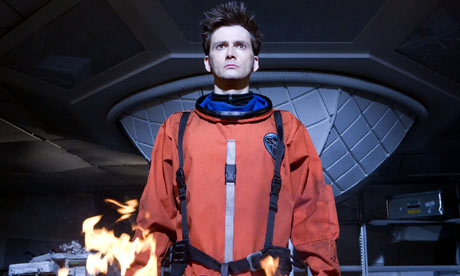Waters benefits from Graham Harper's well-paced direction, a great cast, dialogue which is (for the most part) really tight, a claustrophobic atmosphere and the most terrifying adversary of the new series, bar none. (Seriously, don't give me that Weeping Angels crap). The Floods are implacable, calculating and atavistic - a microbial version of the Wirrn, who absorb knowledge as well as form. Finally, for most of the story, the Doctor wants nothing more than to leave, something we've not seen since Frontios.
A short treatise on The Time Lord Victorious. "The Time Lord Victorious is wrong". Adelaide knows it and so, deep down, does the Doctor. His final confrontation with Adelaide is the most jarring scene in New Who: even though it doesn't feature a burping garbage bin or the aforementioned Cyber-king, it turns the main character away from everything he's been since The Sensorites - The Doctor has become the power, rather than fighting it.
Tennant's song ends in the same manner as Pertwee's - the ultimate result of hubris. Pertwee's character could be thought of as undertaking a voyage of self-realisation; with the producer at the time's Buddhist faith suggesting death and rebirth is a further step along that journey, an event to be celebrated rather than feared. This makes Letts' in memoriam credit before Waters even more poignant and counterpoints the words that most Who fans prefer to forget "I don't want to go". In contrast, and despite the script's other flaws, Pertwee's Doctor regenerated as a result of facing his fears, saying "That was more important than just going on living".
Davies' "Lonely God", was a figure always on the outside - yet at the same time, totally in tune with humankind's emotional inner working. If this Lonely God character is the yin, the yang isn't an evildoer like the Master, or faceless minions of xenophobic orthodoxy like the Daleks, but the Time Lord Victorious.
Deliberate or not, the Waters of Mars saw Davies' Lonely God (starting with the powerful School Reunion) became the vengeful one foreshadowed in Utopia. The Time Lord Victorious, because of everything Doctor Who is, had to end - for it is the way of megalomania in the Whoniverse.
The Time Lord Victorious was the defining moment of Who in 2009, much larger - and infinitely more powerful - than "He will knock four times", the Time Lords' aborted return or even Tennant's farewell. It was from this concept that The End of Time should have been built, with the Doctor seeking redemption, rather than running from his fate. It's disappointing that the regeneration was still so much about Tennant and his angst than the adventure itself.
Such a personable Doctor needed a small-scale, intimate regeneration after the universal upheaval that came with "The Time Lord Victorious". In what should have been the Tenth Doctor's final search for understanding and the sublimation of his fulminating ego, his final story focused more on the General's feelings than on giving his life meaning. The Third Doctor won his final battle; the Tenth only managed a no-score draw.
 |
| courtesy: guardian.co.uk |
The Face of Evil episode three.
Pyramids of Mars episode three.
The Deadly Assassin episode two.
The Pandorica Opens.
All feature the Doctor at a loss, almost utterly vulnerable. Vulnerability should be the essence of any characterisation of the Doctor because he can't, by definition, be all-powerful (see above). His opponents have to be able to threaten him, otherwise they lose all value as adversaries and drama is almost totally removed. The key to entertainment is creating the right amount of resolution to the tension created - in music, comedy, television and literary fiction.
Too much resolution and the plot becomes insubstantial. Too little engenders audience frustration.
In Who terms, this means that unbeatable Doctors never flourish. The instant Tom Baker lost his vulnerability, he became a parody. The impregnability of the Sixth Doctor's ego created some of the poorest Doctor Who ever. If the Doctor is too confident - or dare we say, too capable - then it robs the series of much of it's dramatic appeal.
The Time Lord Victorious is proof enough that invulnerability is a bad thing, and by 2009, Tennant's Doctor was vulnerable only to his own emotion.
Enter - and exit - Adelaide Brooke.
In a word: Confronting.
Rating: 4

No comments:
Post a Comment